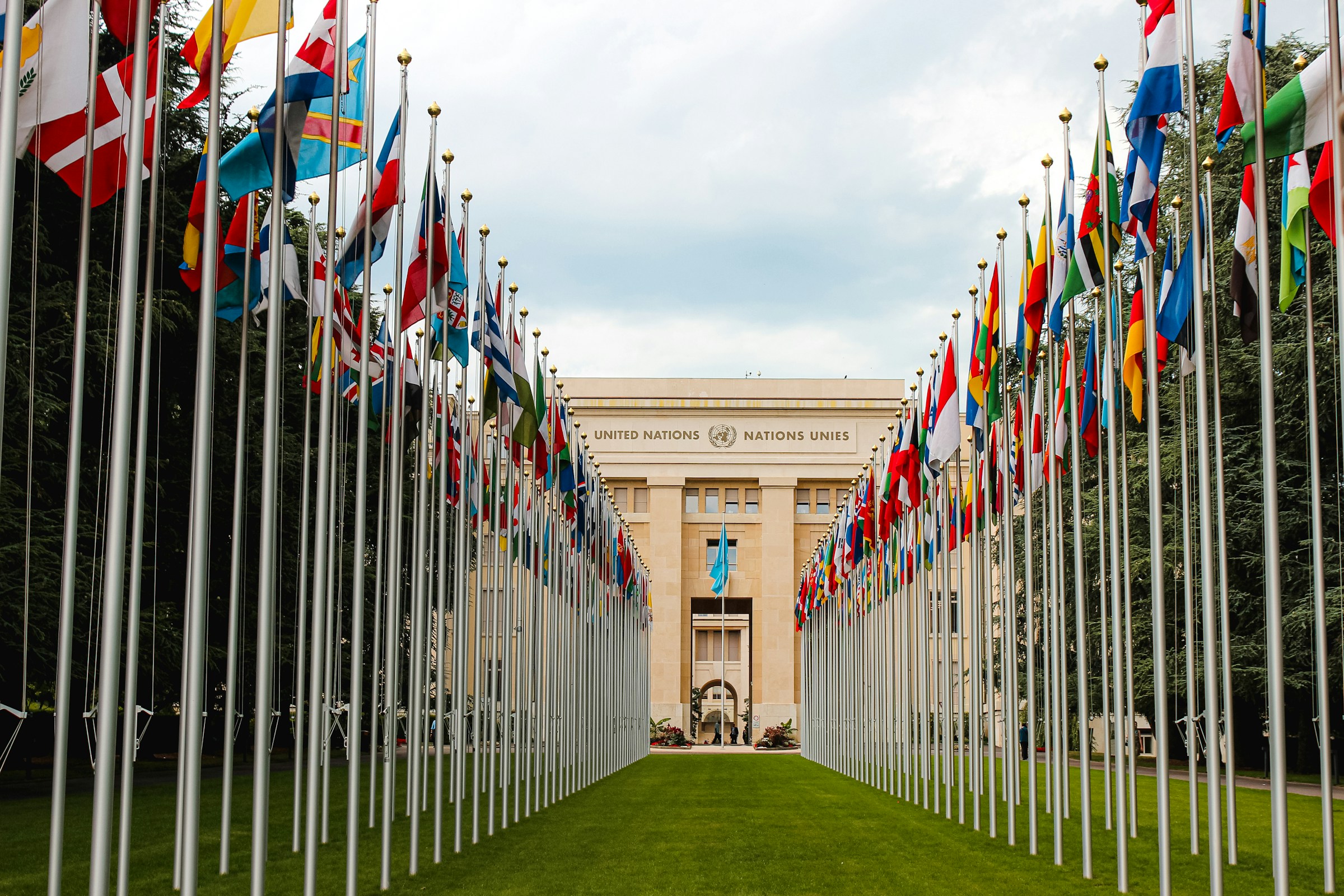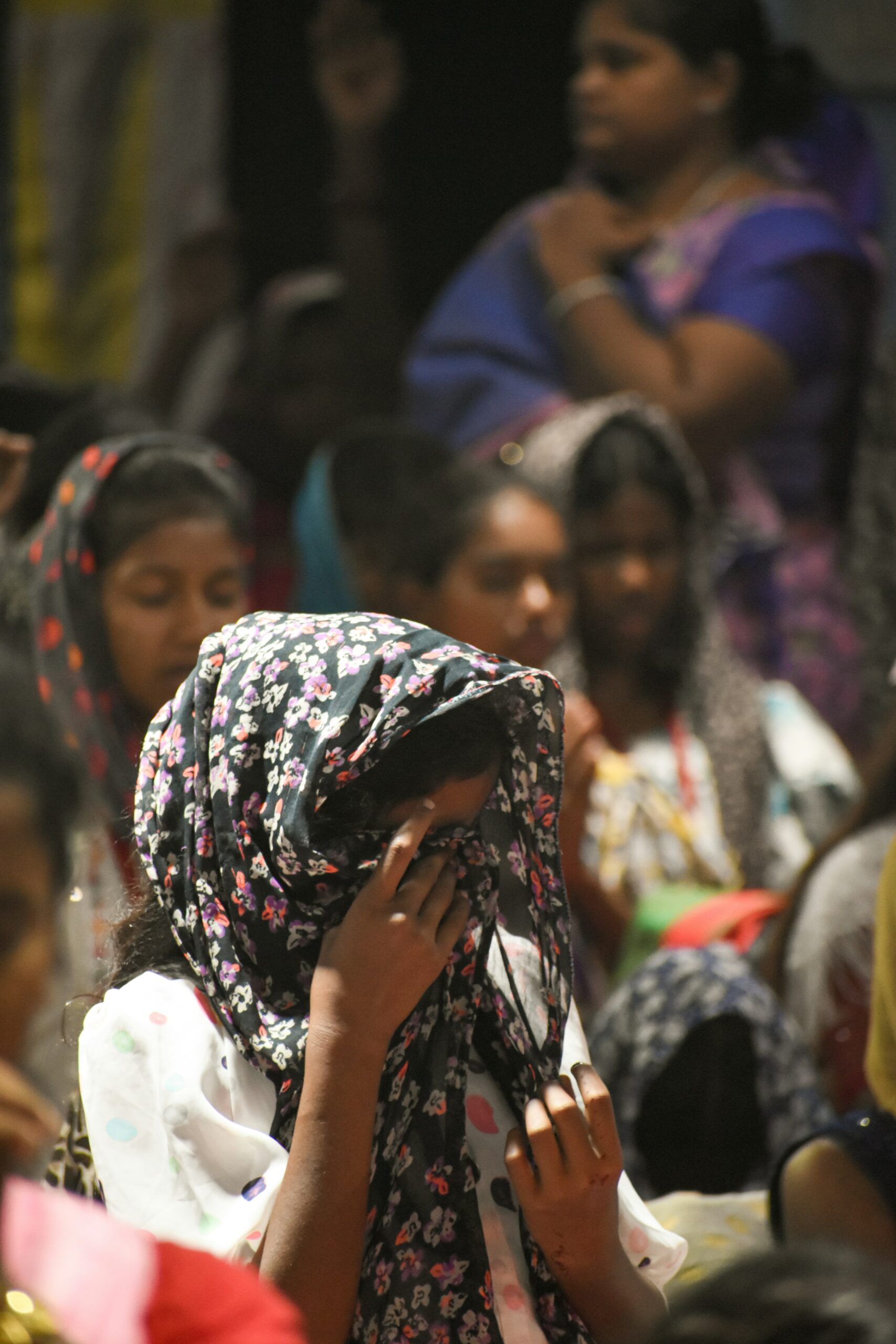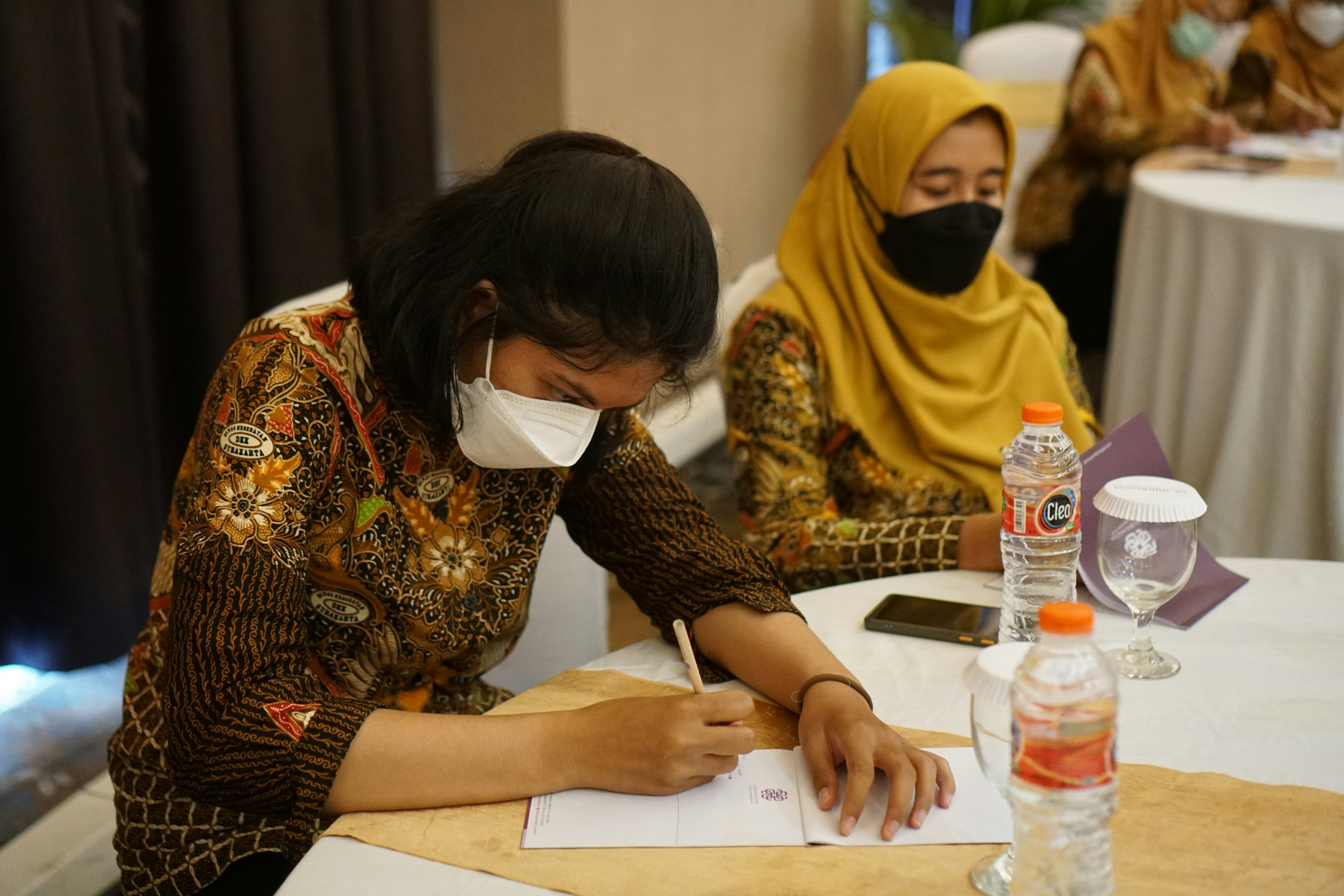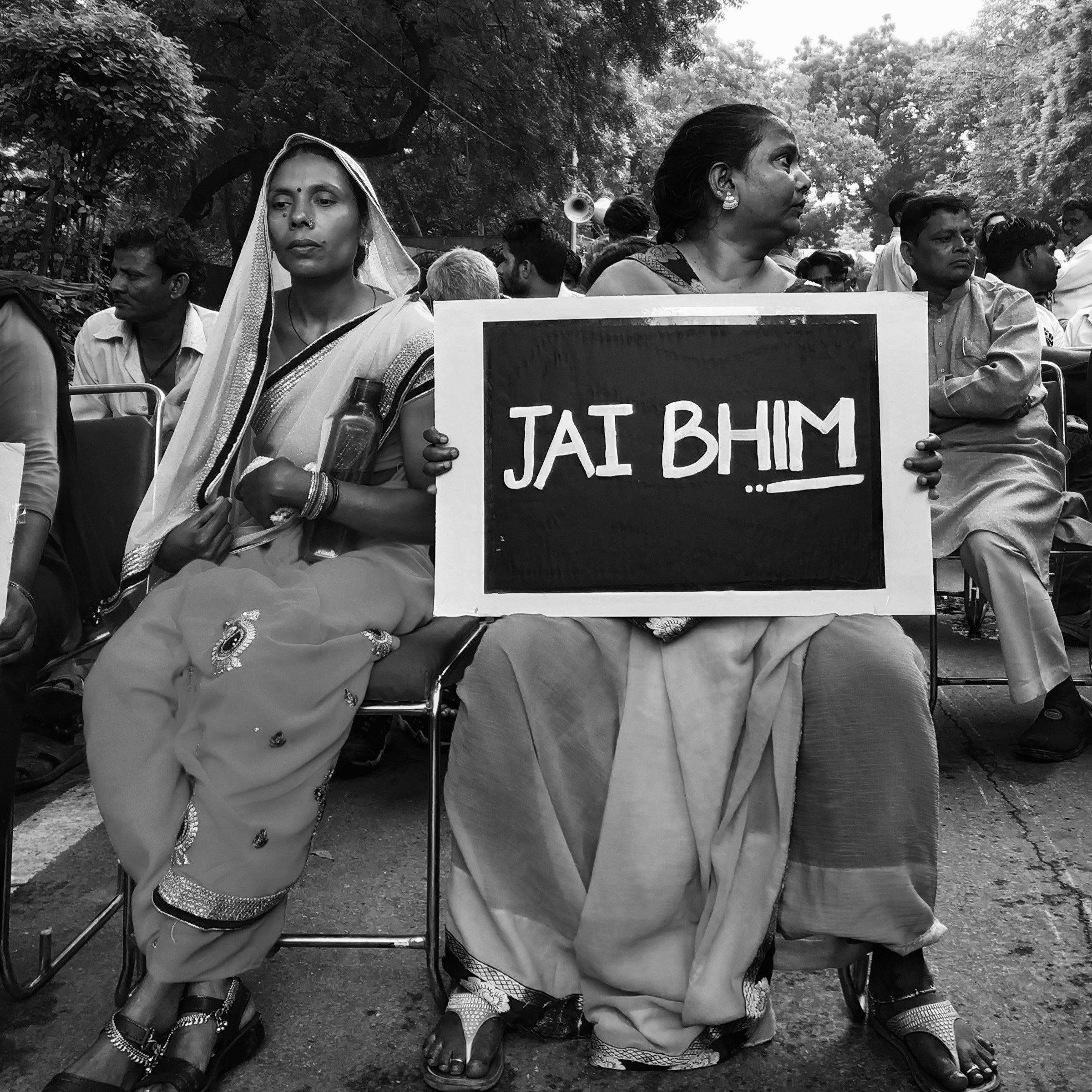Ayomide Johnson and Rafiat Adebowale
As of July 2025, 6,616 non-governmental organisations (NGOs) enjoy consultative status with the United Nations Economic and Social Council (ECOSOC). The merits of attaining consultative status with UN ECOSOC are nearly endless. It guarantees a gateway into the world of international policymaking through access to participation in high-level UN discussions, submission of position papers, collaboration with member states, and even the hosting of parallel events during global summits. However, for many small and mid-sized non-governmental organisations, particularly those based in the Global South, the process of accreditation can seem like a maze of bureaucracy and paperwork.
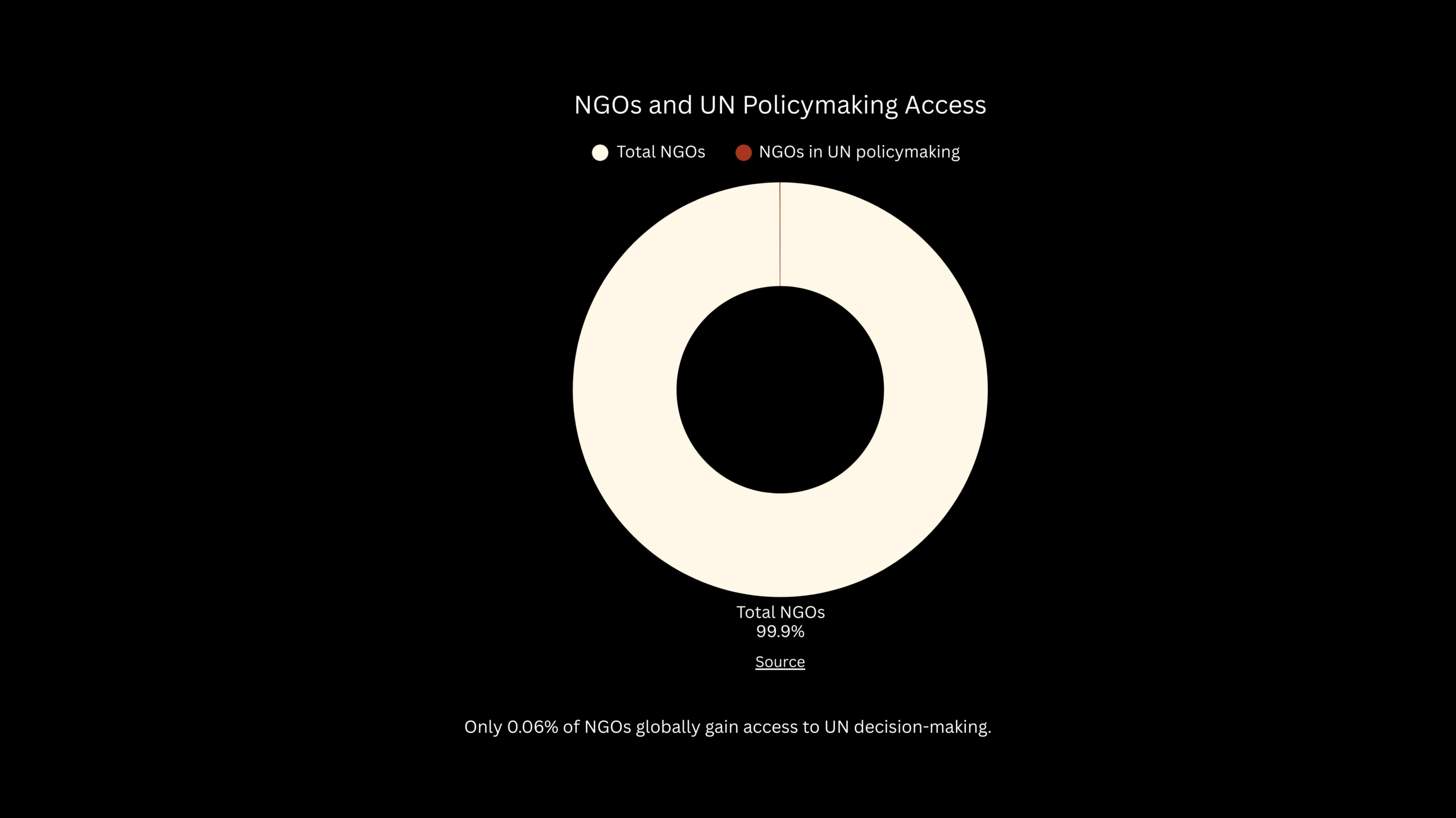
At the start of the decade, DevelopmentAid estimated that there were 12 million registered NGOs globally. This suggests that only a very small fraction, just 0.06 per cent, are able to secure a place in UN policymaking spaces. This figure does not include the large number of NGOs that remain unregistered for various reasons, such as restrictive regulatory environments, financial and administrative challenges, and political concerns, especially in fragile or authoritarian climes.
While we work towards achieving inclusion for unregistered NGOs and grassroots initiatives globally in the long term, this piece explains the process for securing ECOSOC accreditation for the 99.94 per cent of globally registered NGOs that are unable to provide input into international policymaking at the UN. According to a remark by the Secretary-General, António Guterres, civil society is “a key element in solving global problems.” This article breaks down the official UN guidelines into a clear, step-by-step pathway for organisations seeking to amplify their voices on the global stage while also highlighting the lapses in the present approval framework.
First Step: Understanding What ECOSOC Consultative Status Means
Before diving into the process, it’s crucial to understand what ECOSOC consultative status offers. Established under Article 71 of the UN Charter, this status allows NGOs to participate in the work of the UN through the Economic and Social Council and its subsidiary bodies. Accredited NGOs can:
- Attend official UN meetings
- Submit written and oral statements
- Collaborate with UN agencies and member states
- Organise side events
- Receive annual ground passes for UN headquarters in New York, Geneva, and Vienna
Consultative status is granted in three categories: General, Special, and Roster, depending on the NGO’s scope of work and global reach.
Second Step: Registering on the iCSO/ESANGO Platform
The accreditation journey begins with the creation of an organisational profile on the Integrated Civil Society Organizations (iCSO) system, available at esango.un.org. This platform serves as the digital hub for all interactions between the UN and civil society groups. NGOs must first create a profile containing basic organisational information, contact details, and legal identifiers. The name entered must match exactly what appears on the NGO’s registration documents. The profile registration will take approximately 10 minutes, and it is important to fill out all mandatory fields. After submission, the NGO Branch of the UN Department of Economic and Social Affairs (DESA) will verify the details and approve the profile, typically within a few days. It is advised that NGOs refrain from submitting a profile more than once. NGOs with registered profiles can always log in here.
Third Step: Completing the Online Application Form
Once the profile is approved, NGOs gain access to a detailed online application form consisting of 21 questions. These cover a wide range of organisational data:
- Mandate and mission
- Past and current activities
- Geographic scope of operations
- Funding sources and annual budget
- Decision-making processes
- Experience collaborating with the UN or international bodies
The application must be filled in English or French, and the following documents are mandatory for registration:
- Constitution or bylaws (certified copies, including all amendments)
- Certificate of legal registration
- Most recent audited financial statements
In addition, an NGO must provide evidence that its activities are relevant to the work of ECOSOC, that it has been officially registered in any domestic jurisdiction two years prior to the date of receipt of the application by the Secretariat, that it runs a democratic governance structure, and that the majority of its funding is derived from non-governmental sources.
Fourth Step: Application Review and Screening
All applications must be submitted by 1 June of the year prior to the ECOSOC NGO Committee’s review cycle. Between 2 June and the date for consideration by the ECOSOC Committee on NGOs, the NGO Branch reviews the file for technical completeness. If any part of the application is unclear or missing, the organisation will be contacted to make corrections or provide additional information. This review can take several months. Organisations are advised to monitor their emails closely during this time and respond promptly to UN queries.
Once the review is completed, the application is scheduled to be sent to the NGO Committee. The applicant is informed before the relevant session begins. Once the application is placed on the agenda of the NGO Committee, the organisation receives a letter notifying it of the upcoming session and inviting it to send up to two representatives to attend. Attendance is entirely optional; however, all expenses related to their participation must be borne by the organisation itself.
Fifth Step: Consideration by the ECOSOC Committee on NGOs
The Committee on NGOs, a 19-member intergovernmental body, meets twice a year (January and May) to evaluate applications. The Committee is made up of 19 member states, based on equitable geographic distribution. The current makeup for the 2023-26 term consists of Algeria, Armenia, Bahrain, Cameroon, Chile, China, Costa Rica, Cuba, Eritrea, Georgia, India, Israel, Liberia, Nicaragua, Pakistan, Türkiye, the United Kingdom, the United States, and Zimbabwe.
During the session, Committee members representing countries from all regions can ask direct questions to the applicant organisations via the NGO Branch. If the Committee requires clarification, the application is deferred, and the NGO is asked to respond to questions in writing. This can prolong the process by several months or even years.
In 2025, two applicant NGOs were recommended for accreditation after addressing the Committee’s questions during the Q&A sessions in real time. Lamentably, NGOs that cannot afford to have representatives in attendance are most disadvantaged, as they are prevented from providing immediate answers to questions asked by the Committee on NGOs and might have to wait several months. If an application is found to be satisfactory, the Committee recommends the organisation for consultative status. This recommendation is forwarded to ECOSOC for final approval.
Sixth Step: Final Decision by ECOSOC
The full ECOSOC body meets in July to review the Committee’s recommendations and grant consultative status. While it usually accepts the Committee’s decisions, this step marks the formal and final approval. Once granted, NGOs receive official notification and are added to the UN Civil Society Database. They can now begin requesting UN ground passes and participating in events at ECOSOC, the Human Rights Council, and other UN forums.
Seventh Step: Maintaining Accreditation and Participation
Gaining ECOSOC status is only the beginning. To maintain their credentials, NGOs must:
- Submit a quadrennial report every four years detailing their UN-related activities.
- Keep their ESANGO profiles up to date.
- Renew ground passes annually.
- Comply with the UN’s code of conduct for civil society actors.
Organisations may also designate up to five permanent representatives to UN offices, as well as additional representatives for temporary access during specific events. The full protocol on accreditation and representation is available here: UN Protocol Manual – NGO Accreditation (PDF).
Criticisms
The Committee on Non-Governmental Organisations, ironically composed of governments, has faced criticism for lengthy delays in granting approvals for political reasons. NGOs that are critical of the human rights record of any of the serving Committee members or their allies are reportedly at risk of obstructionist tactics disguised as bureaucratic delays.
In-person observers from the International Service for Human Rights (ISHR) reported that, in May 2025, the United States and China accounted for nearly half and one-third of deferrals, respectively, at the NGO Committee session in New York. The use of deferrals as a political tool poses a significant challenge to the participation of Global South NGOs in international policymaking. During the Committee’s most recent session in May 2025, ISHR noted that of the 614 NGO applications for consultative status, 258 were new and 356 were deferred from previous sessions, highlighting a growing backlog and underscoring the need for reform to ensure broader NGO participation worldwide.
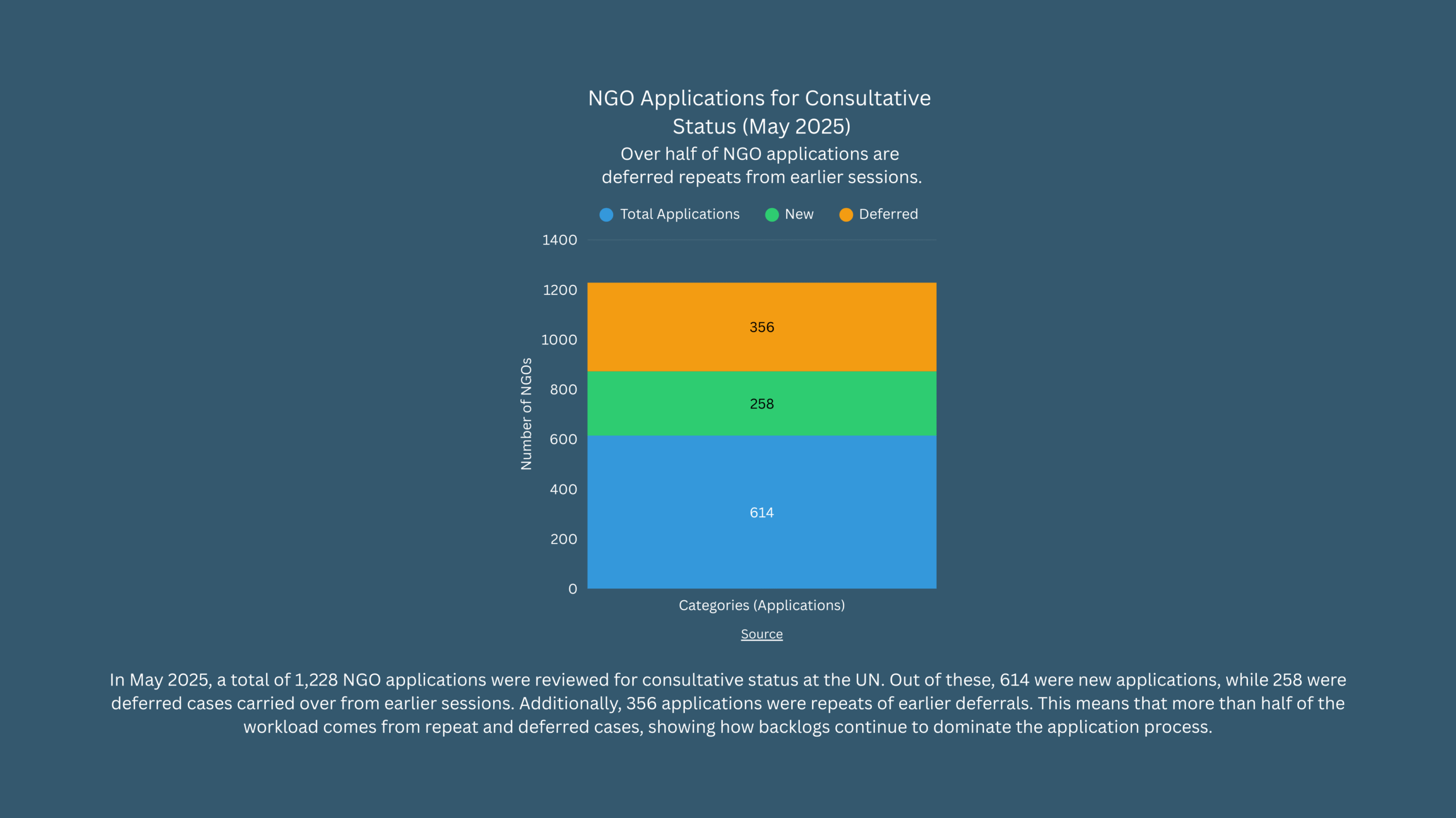
As noted earlier, two applicant NGOs were recommended for accreditation after responding to the Committee’s questions in real time during the Q&A segment of the May 2025 session. For Global South NGOs unable to attend in person, the only lifeline has been the live webcasting of the Committee’s sessions. Unfortunately, this is now uncertain for future sessions from January 2026 onwards, following the announcement by the UN Department for Global Communications (DGCAM) at the last session that it can no longer support live webcasting of in-person meetings.
In summary, while ECOSOC consultative status offers NGOs an unparalleled gateway to influence international policymaking, the path to accreditation remains arduous, particularly for small and mid-sized organisations from the Global South. The process involves multiple steps, including registration on the ESANGO platform, detailed application submission, Committee review, and final ECOSOC approval, each of which requires significant administrative capacity, financial resources, and often in-person representation. Political dynamics within the NGO Committee further complicate access, with deferrals disproportionately affecting organisations critical of certain member states. Without reforms to streamline procedures, expand virtual participation, and ensure equitable treatment, the majority of NGOs worldwide risk continued exclusion from UN decision-making spaces. Achieving genuine global civil society representation will require not only procedural transparency but also deliberate efforts to lower barriers for under-resourced and geographically marginalized actors.
Featured image: Credit: Mathias Reding on Unsplash Infographics by Aarya Dhital, Research Consultant & Specialist on South Asia at Global Divide.
